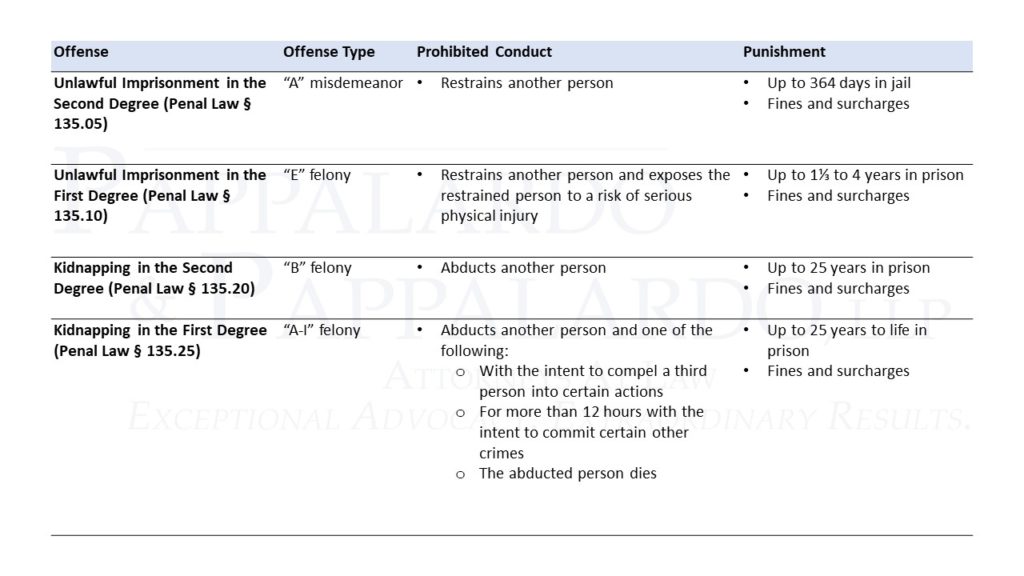New York’s Laws on Kidnapping and Unlawful Imprisonment
Kidnapping cases often appear front and center in the news. Yet the legal definition is often much different from public perception. It is not just the unknown abductor taking a child away in the night. Kidnapping can be charged against family members or friends. Even simple miscommunication between parties could lead to kidnapping charges.
Unlawful Imprisonment or Kidnapping?
Unlawful imprisonment and kidnapping each have very specific definitions under the law. The hallmark of unlawful imprisonment is restraint – meaning a restriction of a person’s movements. But this doesn’t necessarily mean someone is tied up. In fact, restraint can be keeping someone locked in a house. Or keeping someone from moving by intimidating him/her.
Kidnapping, on the other hand, involves abduction. Abduction is defined as restraining someone in a place where he/she is not likely to be found. Or it is defined as restraining someone by use of threatening deadly physical force.
Note that where the victim is less than 17 years old and the defendant is not the parent of the victim, a conviction will subject the defendant to registration in the state of New York as a sex offender.
Defenses to Kidnapping and Unlawful Imprisonment
For both unlawful imprisonment and kidnapping, there is an affirmative defense as defined by statute (Penal Law §§ 135.15, 135.30).
- In any prosecution for unlawful imprisonment, it is an affirmative defense that (a) the person restrained was a child less than sixteen years old, and (b) the defendant was a relative of such child, and (c) his sole purpose was to assume control of such child.
- In any prosecution for kidnapping, it is an affirmative defense that (a) the defendant was a relative of the person abducted, and (b) his sole purpose was to assume control of such person.
One of the reasons for this may be that many cases involve non-custodial parents taking control of their children. But note that custodial interference is also a criminal offense pursuant to Penal Law §§ 135.45 and 135.50.
Additional defenses may include that the victim consented to the restraint or abduction. This can be tricky, however, when the victim is underage and may not have the legal capacity to consent. It may also be a defense that there was a lack of force or lack of an intent to use force.
A Federal Offense?
If a victim is kidnapped and moved across state lines, the crime becomes a federal offense. Under the Federal Kidnapping Act (commonly referred to as the “Lindbergh Law”), such an offense is punishable by a prison term of up to 20 years. If the victim is under the age of 18 and the defendant is not a close family member or legal custodian, the penalties are even harsher. In such circumstances, the kidnapping is punishable by a mandatory minimum sentence of 20 years. There are also additional penalties for kidnapping a child and taking them across international borders.
References:
- Article 135 of the NY Penal Law, “Kidnapping, Coercion and Related Offenses.” Available at: http://ypdcrime.com/penal.law/article135.htm (last accessed Jan. 2, 2020).
- NYS Division of Criminal Justice Services, “Sex Offender Management.” Available at: https://www.criminaljustice.ny.gov/nsor/index.htm (last accessed Jan 2., 2020).
- Chapter 55 of Title 18 of the U.S. Code, “Kidnapping.” Available at: https://law.justia.com/codes/us/2011/title-18/part-i/chapter-55/ (last accessed January 3, 2020).

